- In 1978 Peter Righton and PIE Manifesto author Micky Burbidge team up to exert control over grassroots gay youth groups, establishing the umbrella Joint Council for Gay Teenagers (‘JCGT’)
- Righton & Burbidge take control of the London Gay Teenage Group (‘LGTG’) liaising with the Greater London Council and ILEA for official recognition and relocating the LGTG to Islington, Manor Gardens Community Centre
- In 1980 Chair Edward Heath and his Youth Affairs Lobby (‘YAL’) meet with Burbidge and the LGTG
- With the assistance of YAL Liaison member the British Youth Council (‘BYC’) and its Chair Peter Mandelson, Burbidge gets to take a group of gay teenagers to lobby a group of cross-party MPs directly with Clement Freud MP (Lib), Charles Irving MP (Con) attending with 4 Labour MPs
- By 1982 JCGT and PIE’s Micky Burbidge have been invited to meet with Islington Councillors Bob Crossman, Sandy Marks, Derek Hines and Keith Veness at a Gay Groups meeting – the access to Councillors lobbying groups had was later deplored by Council Chief Executive Leisha Fullick in her report Modernising Islington
- JCGT teamed up with the National Association of Youth Clubs (NAYC) to form GYM (Gay Youth Movement) in time for GYM to campaign for the defendants of the second PIE trial during September-October 1983
1978: Righton & Burbidge devise an umbrella steering group to infiltrate gay youth movement
The backlash against Tom O’Carroll’s publicity stunts such as the public meeting to debate the age of consent in September 1977 did much to paralyse PIE. Mindful of the advice of Dutch MP and lawyer Dr Brongersma, Peter Righton and Michael Burbidge began to change direction, leaving behind the paedophile pride PR of O’Carroll and Hose. Instead Righton and Burbidge focused on energising and organising a gay youth movement supportive of paedophile rights, working with and through regional gay youth groups.
A London Gay Teenage Group (‘LGTG’) had already been established in 1976, for under 21s by under 21s, meeting at Grapevine on Holloway Road. Burbidge and Righton got together to find a way to exert control over a few gay teenage groups that already existed nationally, but particularly focused on the LGTG in Islington, as this was where Burbidge lived and Righton worked.
They came up with the idea of the Joint Council for Gay Teenagers – a permanent umbrella body that would gather any organisations dealing with gay young people under Burbidge’s wing – and influence.
October-November 1978: Peter Righton & Michael Burbidge co-found the JCGT
The first meeting of the ‘Conference on Young Gays’ committee with Burbidge and Righton had taken place on 7 October 1978. At the second meeting on 25 November 1978, (at Grapevine at 296 Holloway Road, London N7) the suggested title of ‘Joint Council for Gay Teenagers’ was adopted.

Righton spoke at the JCGT second meeting on how to develop relationships with relevant professions involved in the welfare of young people – such as social workers and teachers – in order to achieve JCGT’s aims.
“To counter the sexual and emotional fulfilment of gay teenagers by countering the bigotry that denies them the right to it.”
Draft aim of Burbidge & Righton’s Joint Council for Gay Teenagers, 25.11.78
Burbidge kept Nettie Pollard (PIE member #70) in the loop on how he and Righton were progressing with establishing the National Joint Council for Gay Teenagers. Copies of JCGT minutes in archive are addressed to Nettie in Burbidge’s handwriting.
During this period Burbidge was also active in lobbying for the legal defence of PIE by meeting with Dutch youth parliamentary people (as introduced by the British Youth Council), at Burbidge’s Department of Environment offices to discuss options for Dutch support to report back to CAPM. CAPM’s third meeting was attended by (Lord Justice) Adrian Fulford, (Islington Chair of Social Services Committee) Sandy Marks, and two PIE members and NCCL Gay Rights Committee members Nettie Pollard and Tom O’Carroll. As Burbidge was already keeping Pollard appraised of how far progress was being made in pushing his pro-paedophile rights agenda in the gay youth movement, particularly in Islington, it is unsurprising he would document his attempts to network on behalf of CAPM.
1979-80: Burbidge’s booklet ‘I Am What I Am’ lobbies MPs on abolishing the age of consent
Burbidge co-drafted a booklet with which to lobby MPs on the age of consent fronted by gay teenagers. – “I Know What I Am”. While gay teenagers were happy enough to aim for parity in the form of a reduction of the age of consent for homosexual males to 16 – the PIE luminary steering the JCGT was intent on using the opportunity to lobby MPs on the age of consent to argue for its abolition.
For anyone aware that Burbidge was also the co-author of PIE’s response to the Home Office CLRC in 1975, JCGT’s position on the abolition of the age of consent would have come as no surprise.
Burbidge’s “I know what I am” concluded unequivocally in arguing for the abolition of the age of consent, stating that “the only civilised answer… would be to remove consensual sexual acts altogether from the realm of the criminal law.”
The two polarised ideological extremes of the revolutionary socialist stance of gay is good and gay paedophiles are equally as good vs the right-wing christian evangelism of all gays are bad but can be good with enough aversion therapy and prayer meant it appeared as if there was no one in the centre, campaigning for an equal age of consent AND the protection of children from abusers looking to exploit teenagers and children sexually.
LGTG, ILEA and the GLC
Around May-June 1978 Mary Whitehouse’s National Festival of Light (NFOL) Nationwide Bulletin reported their objections to ILEA’s discussions with LGTG. The language used was pejorative (gay youth should be encouraged to integrate to become ‘normal’=’heterosexual’ or mixed youth clubs and to allow gay youth groups was not only socially divisive but also ‘morally corrupting’), and featured alongside a request for funding from christian fellowships to place adverts offering evangelical counselling to those who “struggle painfully with a homophile nature.”
In 2017 the former Chair of LGTG, Steven Power, wrote for School’s Out of Burbidge’s support. The stress and confusion about whether Power would be privately prosecuted by Mary Whitehouse and the National Festival of Light played well for Burbidge, during two especially crucial years of campaigning prior to the first PIE trial of January 1981.
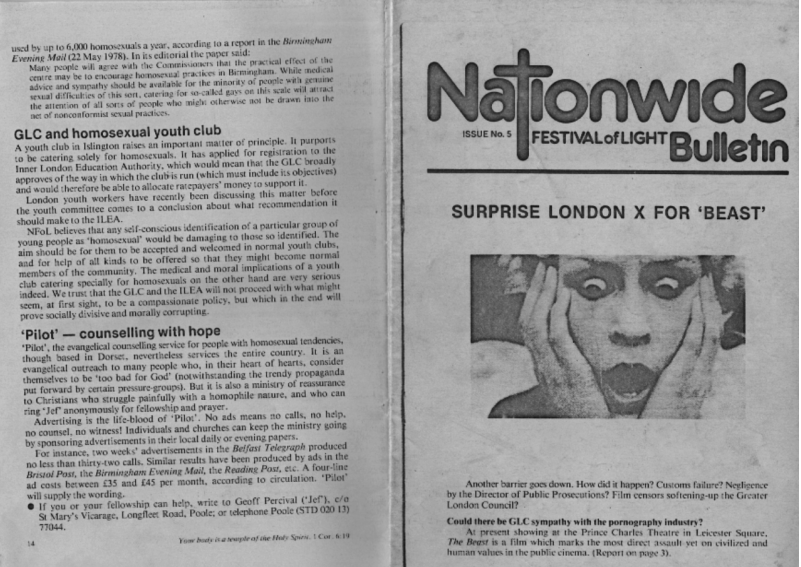
“I was up for ‘conspiracy to corrupt public morals’ (section 5(3) Criminal Law Act 1977). If prosecuted, I faced a maximum sentence of 10 years in prison” … “I was next. But with significant support from a variety of donors, including some prominent MPs, we sought a Queen’s Council (sic) ruling which established the right of young people to meet regardless of their sexuality. A number of people supported me, including Micky Burbidge of Icebreakers, politicians, and others involved in the LGBT community. Without them I would have ended up in prison.”
OUTburst magazine / School’s Out UK Official Guide to LGBT History Month February 2017 p54-55 ‘A Brief History of the London Gay Teenage Group’ by Steven Power
It’s unclear as to what Steven Power was persuaded by Burbidge and others to be in fear of at the time – in another place he talks of Law Lords (as opposed to Queen’s Counsel being paid for a legal opinion) ruling on his case, although he was not prosecuted.

Bearing in mind Power was only 17 at the time who was telling him he was going to be next to be prosecuted? Was Power being used as a human buffer / potential test case fodder by manipulative older PIE luminaries in their forties working through the gay youth movement in Islington such as Burbidge?
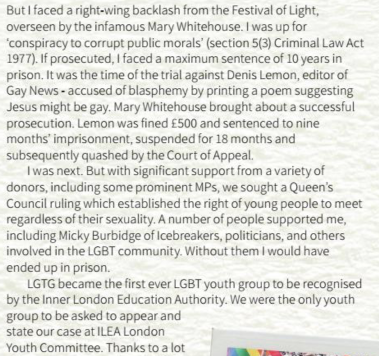
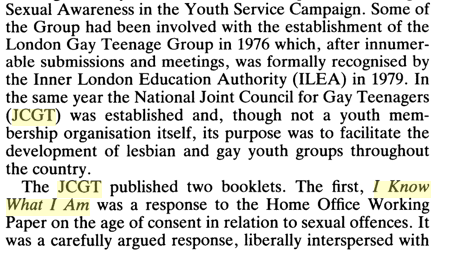
edited by Tony Jeffs, Mark Smith p.115 ‘Sexuality & Youth Work Practice, Peter Kent-Baguley
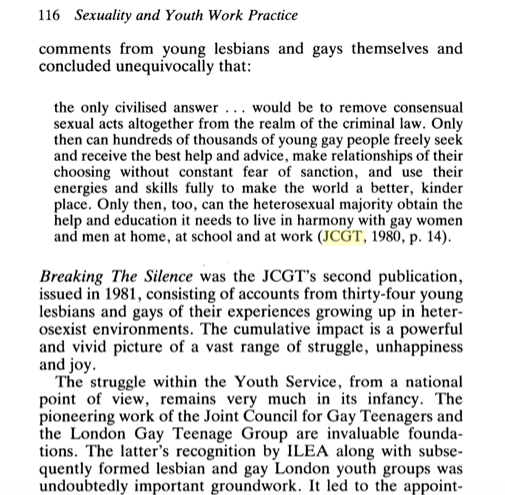
edited by Tony Jeffs, Mark Smith p.116 ‘Sexuality & Youth Work Practice, Peter Kent-Baguley
PIE’s Manifesto objectives
The PIE Manifesto of November 1975 had proposed a “new non-criminal legal framework for determining whether a child’s consent to sexual activity could have been communicated to an older partner, and for prohibiting the older partner from continuing the sexual activity”.
Just as Burbidge’s PIE Manifesto written 5 years earlier had proposed “the abolition of ages of consent, and the removal of consensual sexual activity at all ages from the criminal law”, Burbidge’s 1980 JCGT booklet “I Know What I Am” sought “to remove consensual sexual acts altogether from the realm of the criminal law.”
Both had been written and submitted to the Home Office, the former as ‘Evidence on the law relating to and penalties for certain sexual offences involving children – For The Home Office Criminal Law Revision Committee’ aka ‘The PIE manifesto’ and the latter in response to a Home Office Working paper on the age of consent in relation to sexual offences.
As Home Secretary, Roy Jenkins had set up the Policy Advisory Committee to advise the Criminal Law Revision Committee to review the law on sexual offences. It was in response to Jenkins’ creation at the Home Office that Burbidge addressed the PIE Manifesto and JCGT’s I Know What I Am.
PIE’s faith in Local Authorities and Islington Council’s ‘tradition’/’family secret’
Burbidge and Hose envisaged paedophiles as liberated from the constant fear of prison and all its horrors, with all complaints of sexual assaults on children routed through a new council complaints system. As Burbidge and Hose struggle with setting out a process by which the Local Authority will determine children’s consent to sexual activity with an adult without it become a mock trial or kangaroo court, they find themselves granting local authorities the power to issue injunctions and prison sentences with no right of appeal.
PIE’s proposed legal framework, with its tiered age groups raising rebuttable presumptions of capacity to consent to sexual activity with adults, was to be administered and judged entirely by a Local Authority (council) complaints system. PIE wanted to grant local authority employees the right to act under Children and Young Person’s Act / Children’s Acts powers.
Instead of the police it was to Local Authorities complaints that unwanted sexual activity with children was occurring should be made and it was Local Authority employees as ‘administrators of the Children’s Acts’ who would decide if and how to act to protect the child. Note, PIE defined the issue as “could have been communicated” — the Local Authority would now be the judge of a child’s capacity to consent, which would be presumed possible for all children of 4 years and older. Only for babies and toddlers up to the age of 3 would there be a rebuttable presumption of incapacity to consent.
For PIE to achieve partial implementation of this particular manifesto aim at a local level only three things had to happen:
(1) A council (local authority) had to agree to deal with all allegations of sexual abuse against an employee without involving the police.
(2) Local branches of Trade Unions such as NALGO and NUPE had to be persuaded to adopt a non-discrimination clause including the term ‘sexual orientation’ which pro-paedophile activists would argue to be interpreted as inclusive of all sexual minorities
(3) Pro-paedophile rights activists had to gain positions on the council to ensure policy remain either neutral or positive to pro-paedophile objectives, formally or informally
Interestingly, by 1992 Islington social worker Dr Liz Davies noted NALGO’s response to her as:
“11.5 Although I went to my union NALGO for representation they did not support me and at one time were threatening. The branch secretary called my home number late one night and demanded I meet him outside the union office and that I came alone. Of course I was scared by the call and did not go.”
Personal correspondence with Dr Liz Davies
After 1977, when the legislative change objectives of PIE as a pressure group were proving difficult to obtain public support for and then the Protection of Children Act had whizzed through Parliament suddenly banning indecent images of children, local lobbying at local authority level intent on influencing council policy opened up places for paedophiles where the degree of local community acceptance created a welcoming climate for sexual offenders against children.
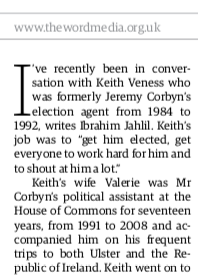
- Islington Councillor and Deputy Council Leader Valerie Veness (1974-1986) went on to work as Jeremy Corbyn’s political assistant for 17 years between 1991-2008
- Valerie’s husband Islington Councillor Keith Veness (1982-1986) was Corbyn’s electoral agent from 1984-1992
- Keith Veness recruited Sandy Marks to the Labour party in 1975 and is currently campaigning for her suspension to be lifted following Morgan QC’s Review determining Marks was more likely than not a Fallen Angel and involved with Conspiracy Against Public Morals, campaigning for PIE
In July 1984 Valerie Veness, Islington Council’s Deputy Leader stated that the ‘traditional’ approach of the Council when an employee was suspected of a criminal offence was for the Chief Executive, Leader and Chair of the Personnel Committee to decide whether to involve the police or deal with the matter as an internal disciplinary concern.
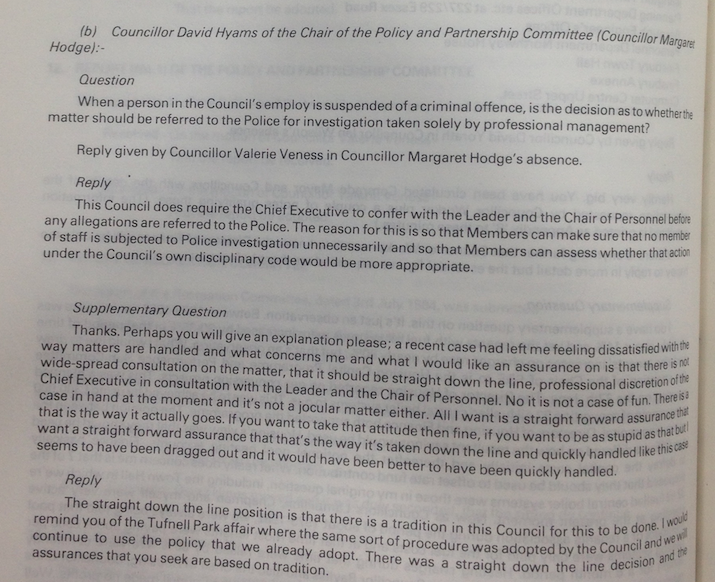
In February 1993 Tunnard & McAndrew’s first report into Islington Council’s failings of its children in care wrote of the Council’s “Family Secret” where staff suspected of criminal offences were allowed to move on with references rather than being investigated by police.
These two pieces of information almost a decade apart tell us that Islington Council had developed an informal policy (or a ‘tradition’ or ‘Family Secret’) of not involving the police where council employees were suspected of criminal offences.
If this ‘tradition’ or ‘Family Secret’ applied to residential staff accused of sexual offences against children as council employees, the number of abusers who found positions with Islington in residential childcare would have been extremely difficult to remove, until the Evening Standard expose of October 1992 led to an exodus of staff almost overnight.
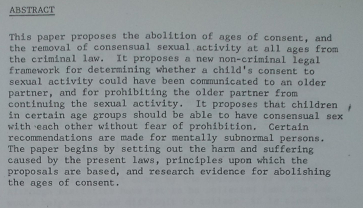
Only if an abuser, having already abused a child and been subject to a restraining order preventing further contact with the child, breached the order and contacted their victim would they be subject to a fine and/or imprisonment.
“In the event of breaches of prohibition, fines or terms of imprisonment could be applied.”
So despite promising to liberate paedophiles from the fear of prison, the PIE Manifesto had merely argued for moving the seat of decision making away from the police to the Local Authority, cutting the Director of Public Prosecutions (1985 onwards CPS) out of the decision to prosecute also, apparently granting councils the power to impose prison sentences en route!
The faith that paedophile rights activists had in the will and ability of Local Authorities to become the sole adjudicators of whether children were being sexually assaulted en masse must have been incredibly strong to suggest placing all this unaccountable power as some form of a kangaroo-court in their hands (right of appeal anyone?)
What gave Islington resident Burbidge his deeply-held belief that were local councils to become solely responsible for adjudicating on the capacity of children to consent to sexual activity with adults they would exercise their power to the benefit of paedophiles is unclear.
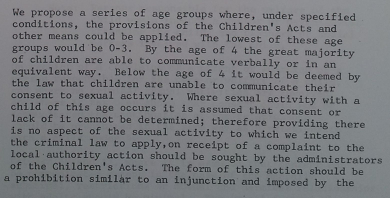
Where “sexual activity with a child of this age occurs”, e.g. babies and pre-schoolers 0-3 years old (note there is no subject in this sentence such as a paedophile assaulting a child, sexual activity just spontaneously happens), a complaint should be made to the Local Authority who employs “administrators of the Children’s Acts” who could then seek a civil injunction/restraining order imposed by the “administrators of the Children’s Acts”. If the Local Authority fails to prevent the adult from contacting or assaulting the 0-3 year old child again, the Local Authority get to step in and take the child into care.

Local Authorities already had designated officers and members with delegated Children’s Act powers, the officers working in the Social Services Department as Social Services Directors (SSDs), Assistant SSDs and senior social workers all had certain delegated powers as did elected members (councillors) serving on the Social Services Committee of the Council.
Only where a Local Authority could promise never to involve the police in an allegation of sexual offences committed against children and investigate and adjudicate themselves, could the criminal law be almost kept at bay in the same way as if paedophilia had been decriminalised through legislative reform. Changing legislation at a parliamentary national level to decriminalise sexual assault and rape of children became secondary to PIE’s objectives.
Where possible, through a combination of change in policy and practice by local authorities, communities of paedophiles fought for the space to breathe and grow in confidence and pride, supported in small localised safe havens.
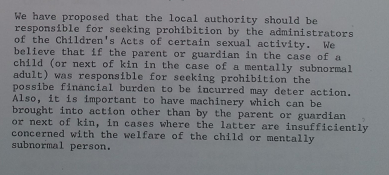
Note: Burbidge & Hose are only interested in establishing rebuttable presumptions of capacity to consent
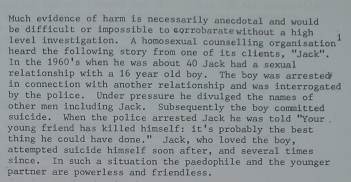
Burbidge’s evidence of harm of is drawn from a single anecdote from a client of one of his counselling group ‘Icebreakers’ – using a paedophile client’s one-sided account of his relationship with a 16 year old boy.
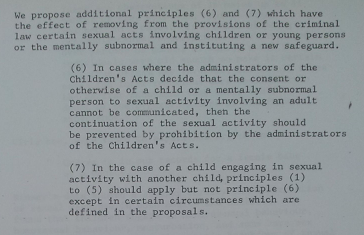
PIE’s “new safeguard” was giving the ability to the Local Authority “administrators of the Children’s Acts to issue a prohibition injunction preventing further and continuing “sexual activity” (now surely capable of being defined as sexual assaults and rapes even according to PIE’s crime-free lexicon) with the child.
It was with a very clear strategy that Micky Burbidge and Righton had started making inroads into Islington’s gay teenage group, plotting a path to Parliament and a direct and public platform from which to pressure politicians over the age of consent.
April-July 1980: JCGT’s success Burbidge goes to Parliament with the help of Mandelson and Heath
Burbidge’s triumphant if little-reported arrival in the House of Commons with an entourage of teenagers was facilitated by the Youth Affairs lobby, an early version of the Youth Parliament, chaired by Edward Heath MP, with the help of a YAL Liaison Group Committee member – the British Youth Council, chaired by Peter Mandelson.

Notes for Jo Richardson MP on the joint JCGT and YAL presentation at the House of Commons billed Burbidge as the main author of the JCGT response to the Home Office Working paper on the age of consent in relation to sexual offences — titled “I Am What I Am”.
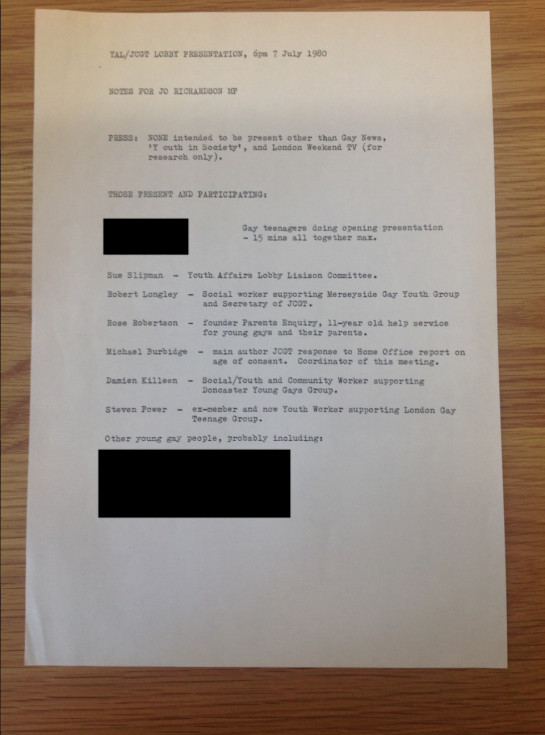
On 11 April 1980 representatives from JCGT met with a Liaison Group from the Youth Affairs Lobby (‘YAL’), the Chair of which was Edward Heath MP. As a result of that meeting, YAL felt very strongly that they should assist with getting Michael Burbidge’s group access to Parliament. The next meeting with more MPs was originally scheduled to take place on 20 May 1980 at 5.30pm.
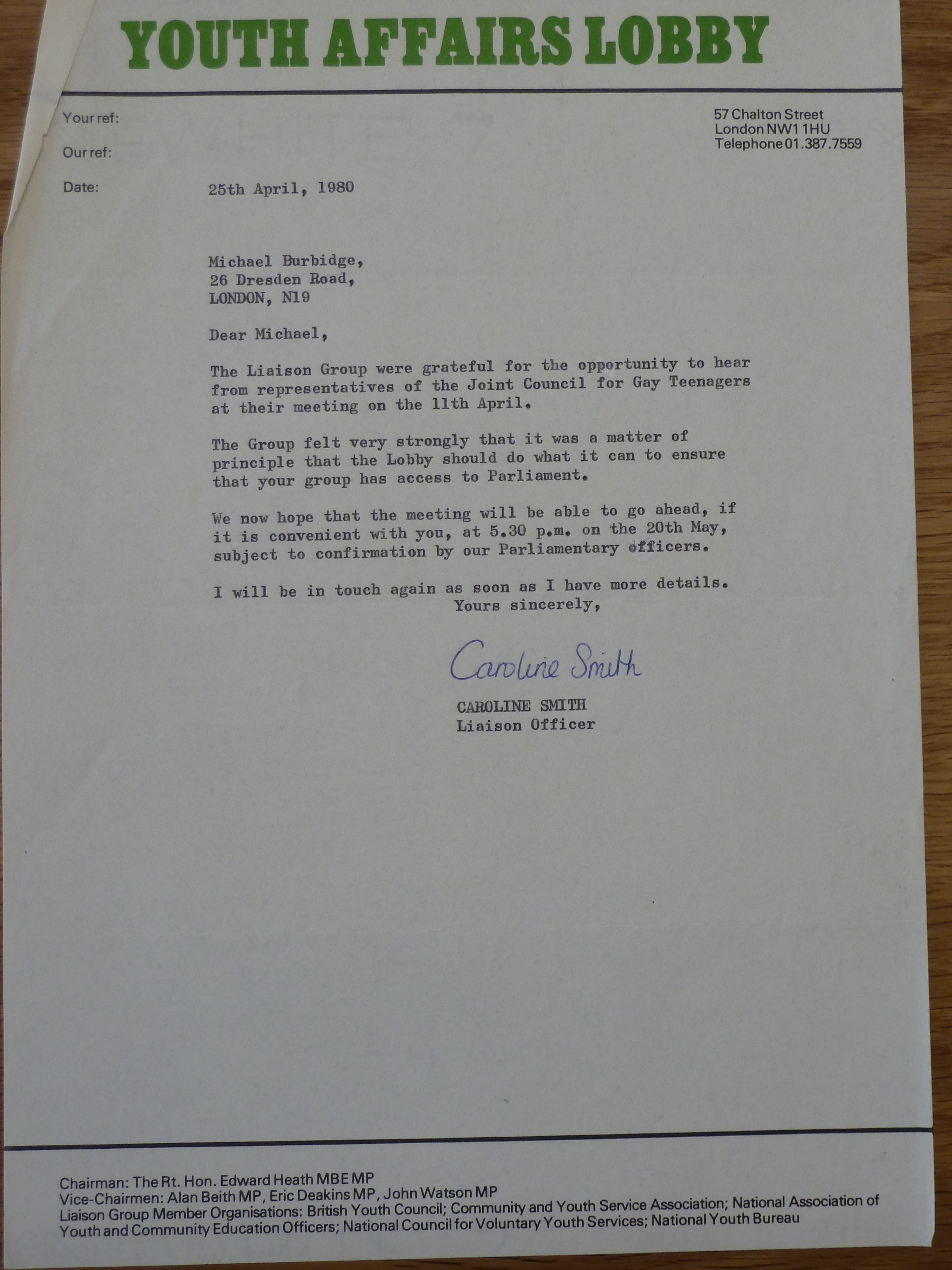
Former national President of the National Union of Students (1975-1978) Sue Slipman, aged 30, had taken up a position as an area officer with the National Union of Public Employees (NUPE) while she also served on Heath’s Youth Affairs Lobby Liaison Committee as a volunteer.
Steven Power, former Chair of the LGTG attended the first meeting with YAL as the LGTG youth worker and in 2017 he wrote of Edward Heath MP attending this first meeting on the age of consent
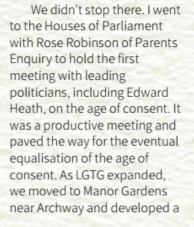
By July Burbidge’s group had the access to lobby MPs directly that Edward Heath and his Liaison Group from the Youth Affairs Lobby had felt so strongly about.
7 July 1980: Burbidge’s audience of MPs at the House of Commons
Gay News covered JCGT’s next event at Parliament where Burbidge was able to publicly apply pressure to MPs – it was the first time a lobby of MPs had been called together on homosexual rights, not by a gay group, but by the “non-aligned” Youth Affairs Lobby. More than 30 people attended – a delegation of about 15 from the JCGT and its supporters appeared in the photo posed for outside the House of Parliament. Burbidge was hopeful that through changing direction and organising for pro-paedophile rights within the gay youth movement further access to lobbying MPs would be possible:
“After the meeting, Micky Burbidge, a member of the Joint Council for Gay Teenagers and co-ordinator of the lobby, said: “The next step is that there should be a meeting of interested MPs to work out what we can do now.”
YOUNG GAYS DEMAND ACTION, GAY NEWS, July 1980
Notes prepared for the YAL/JCGT Lobby Presentation gave Jo Richardson MP a brief introduction to each attendee
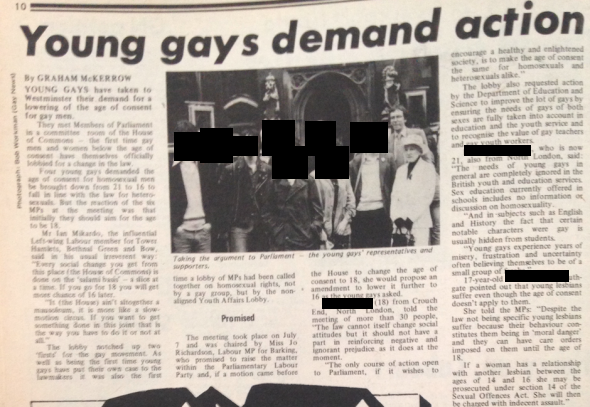
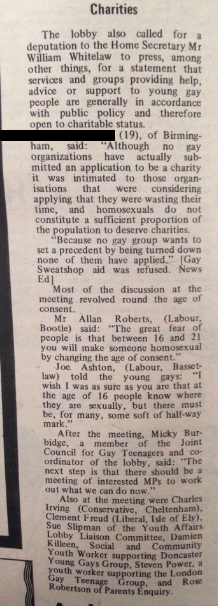
Any MP known by the Paedophile Information Exchange members to have a sexual interest in either
(a) children under the age of 16 ; and/or
(b) young men aged 16-21
was now in danger of being publicly put under pressure to abandon their hypocrisy and give support to abolishing the age of consent or at the very least parity for the age of consent with heterosexuals.
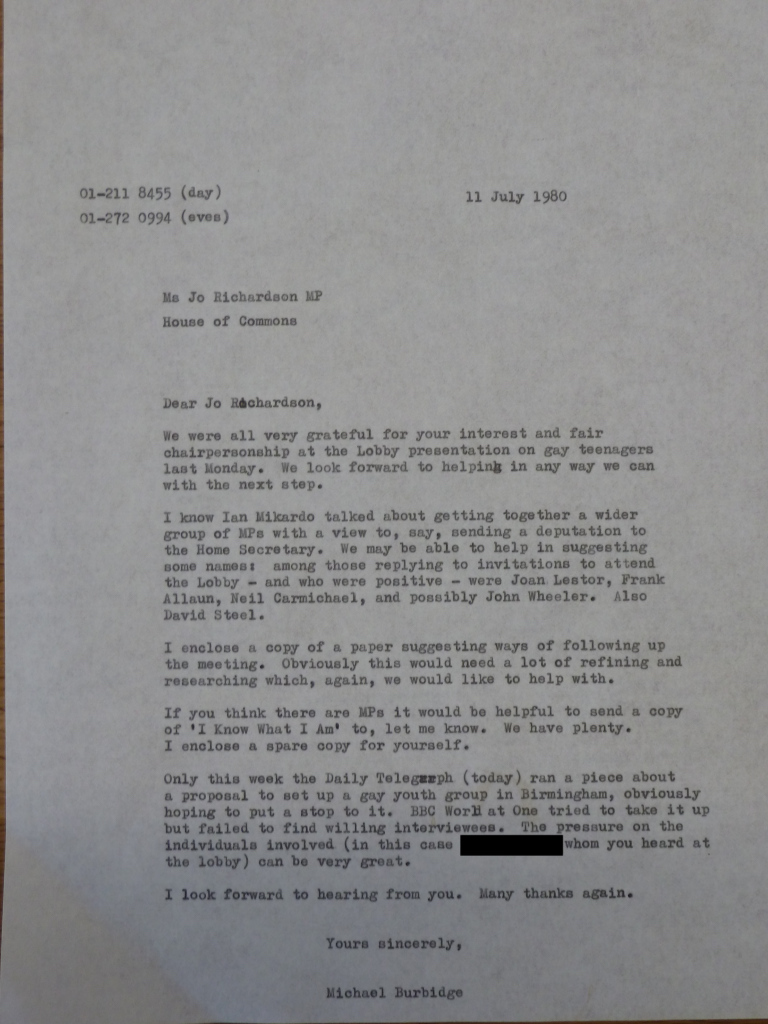
Throughout 1979-1980 Burbidge and the JCGT had been trying to find a way in which they could publicly raise the issue of gay youth and the need to abolish the age of consent by sending a deputation to the door of the Home Secretary (at the time Willie Whitelaw)
Burbidge felt that if he could just gather together the MPs who had shown the most interest, David Steel, Joan Lestor, Frank Allaun, Neil Carmichael and John Wheeler, he could capture their interest and gain their support for JCGT.
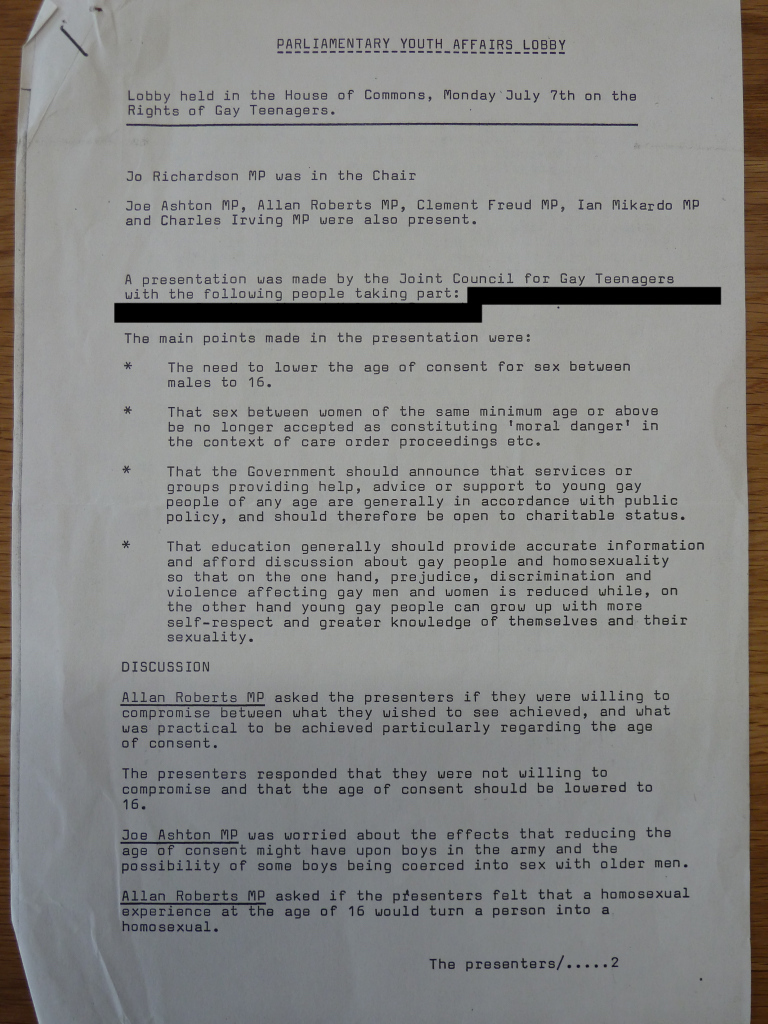
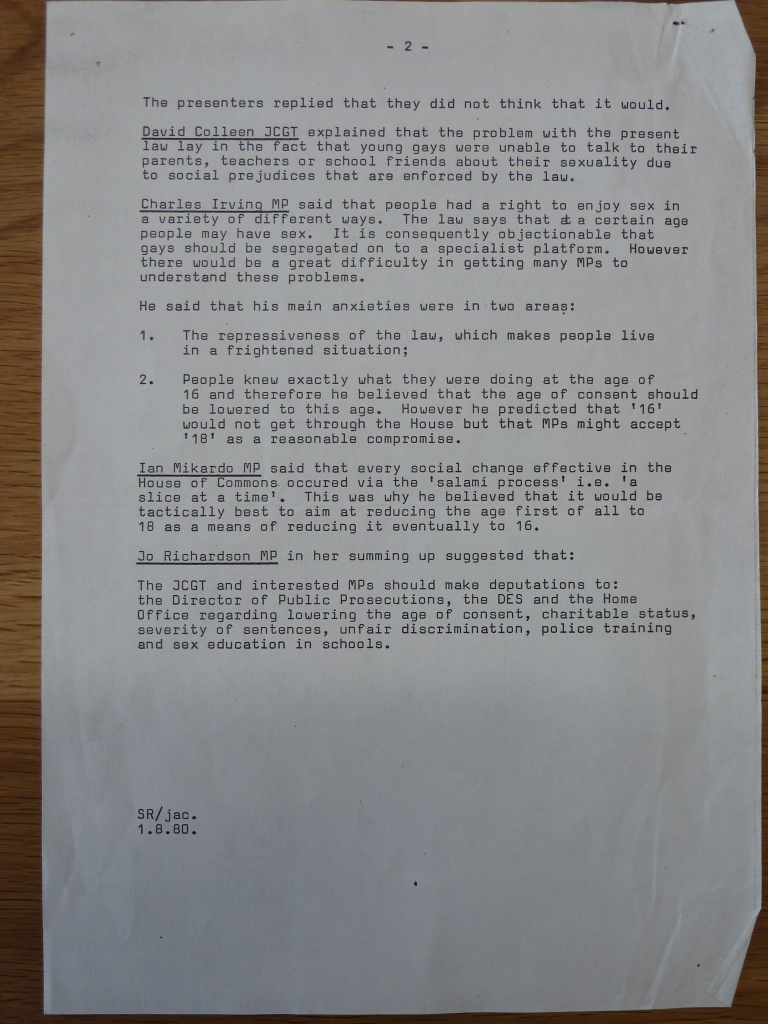
Despite the success of having achieved an audience with MPs, their response was disappointingly unfair in relation to their own private lives, and for some individual MPs we can now see it was outrageously hypocritical in view of their own sexual preferences.
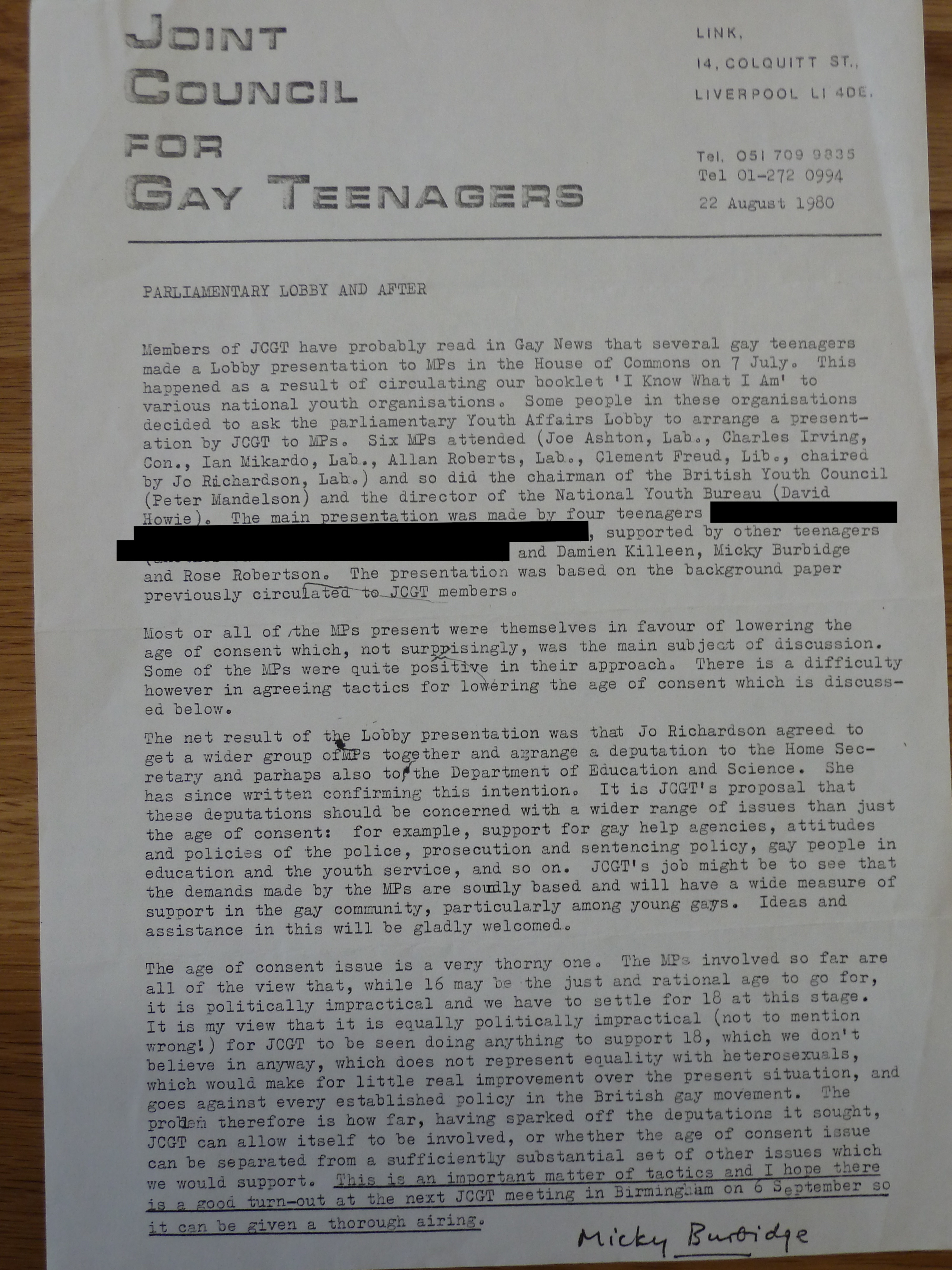
As indicated by Burbidge’s last paragraph in his update to JCGT Members above, the JCGT were being offered support for a two-step approach to achieving parity of age of consent – equality with heterosexuals – but the MPs could offer little else.
Burbidge and his JCGT entourage met with 6 MPs: 4 Labour, 1 Liberal and 1 Conservative and 1 future Labour MP: Peter Mandelson, who was then the Chair of the British Youth Council.
Only one of the MPs noted as attending is female – the Chair, Jo Richardson MP (Lab: Barking).
Through her close involvement with the NCCL Jo Richardson MP had become the go-to representative for ideas on how to lobby for paedophile rights in Parliament. Richardson’s biddable responses to Nettie Pollard’s requests are recorded in NCCL Minutes, whether it be complaints that press reporting on criminal trials involving PIE was prejudicial or the impact of the protection of children bill by outlawing paedophile positive imagery (otherwise known as images of child sexual abuse), Richardson was always willing to see if there was a way she could assist.
In 2012 Nigel West wrote that Richardson had been named in 1985 by Oleg Gordievsky when he’d defected – she had been identified as a “confidential contact” of his embassy. West asked “But were they simply “agents of influence” peddling the Kremlin line on any particular topic, or something more sinister?”
If you consider the inside track Richardson had on which MPs in the Commons to speak to for a positive approach to issues concerning paedophiles, even as an “agent of influence” pushing for the normalisation and decriminalisation of paedophilia in plain sight, Richardson’s role throughout 1974-1984 with regards to PIE is deeply sinister and was surely treated as a threat to national security. Was Richardson under the same kind of surveillance by the Special Branch as activists of all kinds have found in the impetus to launch the Spy Cops Inquiry?
Clement Freud (Lib: Isle of Ely) In June 2016 it was revealed that Freud’s name had been given to Operation Yewtree in 2012 and that at least three women had come forward to report rapes and sexual assaults by Freud against them as children during the 50s, 60s and 70s. As a heterosexual ebephile sexually interested in grooming and molesting females aged 10+ Freud was particularly susceptible to pressure had it been known he’d moved a young girl he was sexually abusing from the age of 10 into his house as an au pair to his children. Telegraph
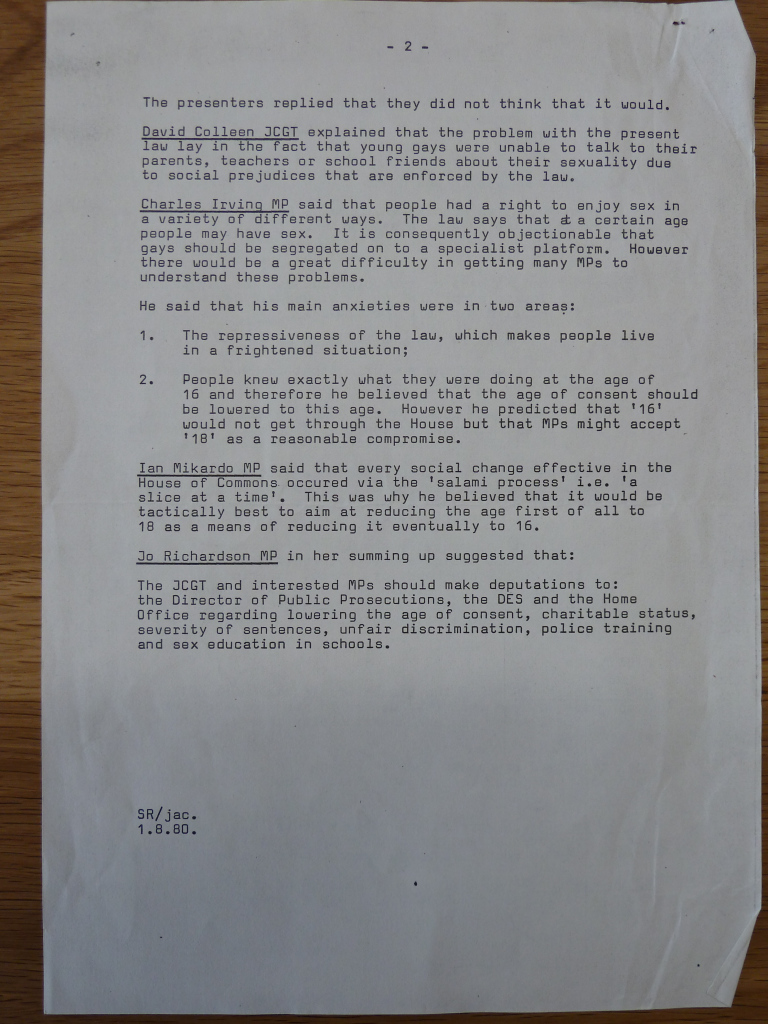
Ian Mikardo (Lab: Tower Hamlets, Bethnal Green, Bow) was criticised for his threats to block the Protection of Children Bill two years earlier. Richardson was very much his protege having started life as Mikardo’s secretary to the Tribuneites
Allan Roberts (36) (Lab: Bootle): At the time of meeting Burbidge and his group, Roberts was a recently elected MP just over a year in his seat, having failed to get elected in 1974 in [ ]?. A senior social worker with Lancashire County Council, (initially trained as a teacher at Didsbury Teacher Training College and Manchester University) and a former teacher in primary and secondary schools, Roberts had experience in and connections to the professions Peter Righton had identified as so important in supporting JCGT in their aims back in 1978.
As Chair of Manchester Housing Committee, while a councillor, Roberts also had strong opinions on housing which echoed the views of Burbidge. In his Tenants (Consultation) Bill of 1982, which failed, Roberts embraced everything Burbidge could have hoped for in an attempt to legislate for tenant democracy and to enshrine in law the right of tenants to take over the management of estates (with government funds).
The year after attending Burbidge’s parliamentary lobby the News of the World revealed Roberts had attended a party in Berlin’s Buddy Club (organised by the Motorcycle Leather Club), at which he had donned a dog collar and been whipped by a man in SS uniform before a crowd of S&M enthusiasts . The man who had paid his medical bill when he had required medical treatment for the whipping was none other than Charles Irving MP – his fellow attendee at the JCGT Parliamentary Lobby orchestrated by Burbidge and Heath.
Charles Irving (57) (Con: Cheltenham since October 1974) As above Irving had paid for Roberts medical bills in Berlin. A large eared broad faced millionaire hotelier from Gloucestershire, Irving’s attention to detail in hosting would serve him well managing the House of Commons Select Committee on Catering 1979-1992. A discreet adviser to the Conservative Group for Homosexual Equality for years, in 2014 Irving was alleged of having been involved with a clique of Conservative MPs who sought out young men and teenagers to sexually exploit. [July 2014, Mirror]
July 1982: Islington Council invites JCGT to the table
In July 1982 the nominally National “Joint Council for Gay Teenagers” was invited to a roundtable “Gay Groups Meeting” convened by Islington Councillor Bob Crossman.
Crossman had been outraged that the toilet on Richmond Avenue had been reported as unsafe for children and demanded that if more resources were given to gay groups gay men wouldn’t have to “wave their penises at each other” in toilets in order to meet one another. No mention was made of that fact this particular public toilet was located not far from the Hemingford Arms, a well known gay pub, but also where PIE held meetings upstairs. The Richmond Avenue toilets were often used by children playing in Barnsbury Gardens.
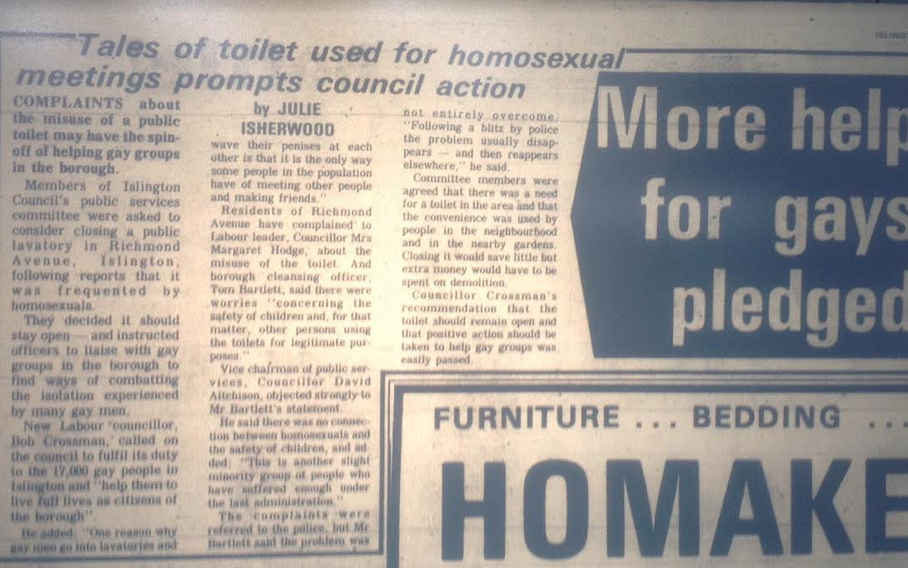
“One reason why gay men go into lavatories and wave their penises at each other is that it is the only way some people in the population have of meeting other people and making friends.”
Bob Crossman on concerns for safety of children visiting Richmond Avenue public toilets, Islington Gazette 11.7.82
The Gay Groups Meeting Crossman convened was as a direct result of his demand that more resources be provided to gay and lesbian organisations. A number of the invitees to the Council’s Gay Groups Meeting were of the same view as the Fallen Angels, the pro-paedophile rights group Councillor Sandy Marks had been involved approximately 18 months before becoming elected, namely that paedophile rights to liberation such as the abolition of the age of consent should be embraced by and campaigned for within the mainstream gay rights movement.
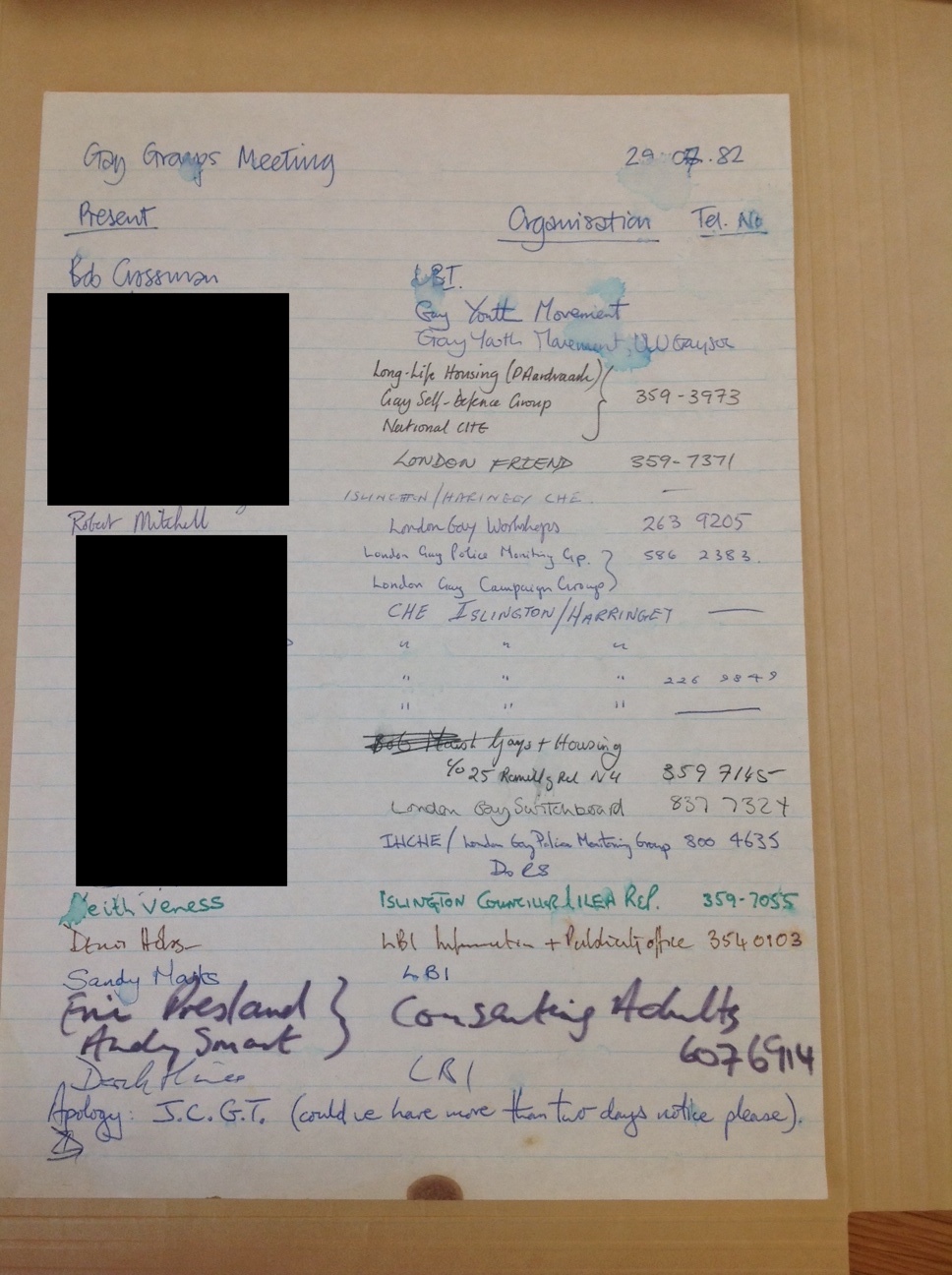
Hailed as a PIE supporter by PIE chairman Steven Adrian Smith, Eric Presland, was invited to the meeting by Cllr Bob Crossman and met with Cllr Sandy Marks and Cllr Keith Veness. Veness, who was soon to become Jeremy Corbyn’s electoral agent for the next 9 or so years, has since defended Sandy Marks’ various denials of her involvement with Fallen Angels and following her suspension has demanded her reinstatement to Islington North Constituency Labour Party. In September 2017 in the Islington Tribune a friend of Sandy Marks observed she was being made the fall guy for those who shared her pro-paedophile views. However, with Marks’ return to a complete denial of involvement to Morgan QC’s review of November 2018 it remains to be seen whether Islington Council can follow through on a commitment to understanding the politicisation of paedophilia within the Council.
Eric Presland ran Consenting Adults, an Islington based mixed gay community theatre group putting on a weekly drama workshop. The year before attending the Islington Council meeting Presland had contributed a chapter on “Whose Power? Whose Consent?” in a book edited by North American Boy Lovers’ Association (NAMBLA) luminary Daniel Tsang on “The Age Taboo: Gay Male Sexuality, Power, and Consent”.
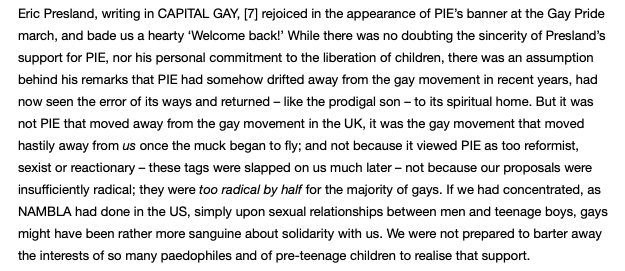
1983: JCGT disbands; Old Fogies forms
At last Righton and Burbidge had produced the kind of front the National Association of Youth Clubs (NAYC) could work with publicly and together NAYC and JCGT organised an annual conference for the Gay Youth Movement. Once GYM was established as an independent group of its own JCGT announced their disbandment in summer 1983. However within 6 months it was felt appropriate to set up an organisation called the Older Friends of Gay Youth (The Old Fogies) to inter-relate with GYM.
At a GYM weekend workshop in Southampton at the end of November 1983 planning for an Easter conference was underway. Jimmy Savile with his long connections to NAYC and sexual interest in children, was to be invited to sit on a panel with other celebrities.
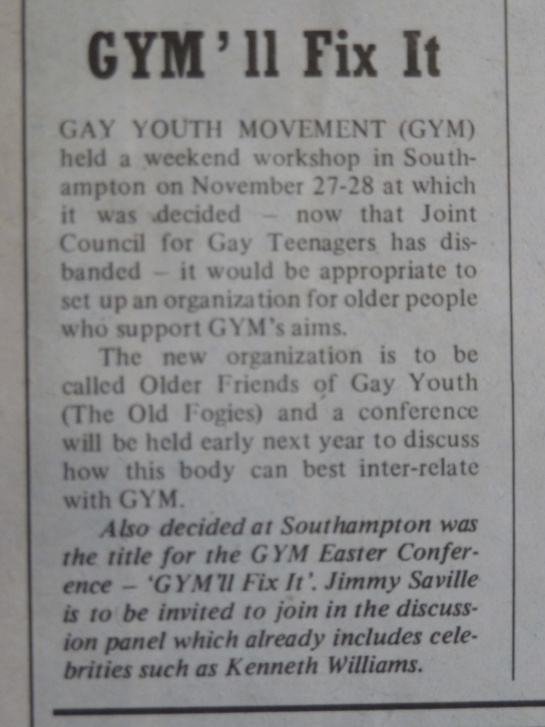
By the time of the second trial of PIE defendants during September-November 1983, Righton and Burbidge’s infiltration of the Gay Youth movement had proved so successful Gay Youth magazine (GYM’s magazine) had its support for PIE declared on the front page with accompanying obligatory cartoon.
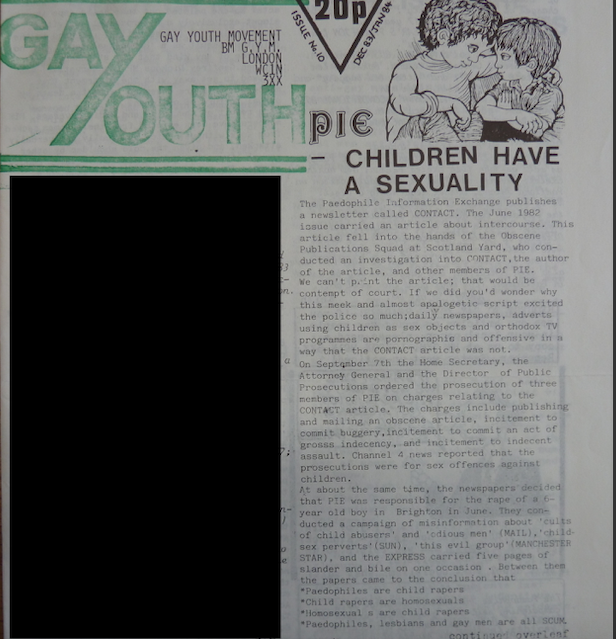
How far PIE’s luminaries succeeded with their attempts to persuade Islington to rally to support PIE during its second trial after CAPM and Fallen Angels’ failure of 1981 remains to be explored in more detail.
But by November 1983 Chapel Market traders were organising a petition against PIE which Council Leader Margaret Hodge signed. If the majority of Islington’s Councillors appeared unaware their borough was being targeted by PIE, Islington’s residents were attempting to alert them.
2 comments